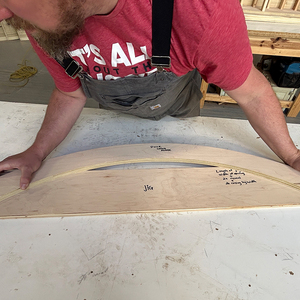Hi Everyone,
Has there been a discussion on this topic?
I did a search but came up blank.
I mostly do additions in the range of 1000 to 2000 sq. ft.
and have had some go from ground breaking to finished in 2 1/2 months for a 1900 sq. ft. and
1300 sq. ft. that was much more detailed and went on for 6 months.
Certainly much of it has to do with having one’s ducks in a row and good detailed plans and specs before breaking ground. But there are jobs that involve a lot of complicated work by your crew and or subs that can seem to expand in time beyond reasoning. Not to mention subs who are working too many other jobs and don’t focus on a single project.
Anyway, I’ve just been trying to figure out a way of looking at this and wondered what kind of approaches all of you used.
And, I thank everyone in advance for your thoughts!
Tom




















Replies
we seem to get stuck on about 6 to 8 months... typical addition.. full foundation, split levels couple of baths or a kitchen included.. and very patient customers...
until about two years ago , it seemed possible to move it a little faster... now things just get strung out...
Mike Smith Rhode Island : Design / Build / Repair / Restore
Hi Mike,
Have you been able to figure out what it causing jobs to stretch out into many months? I am finding it difficult to give a firm time frame to clients as there are so many variables. And even if you do have a good plan to begin with there are always changes during the job which can throw a wrench in the flow.
Tom
When Arch and/ or Client are concidering changes in the Scope of Work, there should be a Change Order that documents it. This form should have a line item which states the number of days/ weeks to be added to/ subtracted from the job. Doing this on your future projects will pinpoint where your time is accurate and not. It also keeps the Arch and Client apprised of the ramifications of their decisions. When they drag their feet in making decisions (two days), I write them a memo informing/ re-emphisizing the delay, and staple a copy of it to MY copy of the CO. This way when they complain that the job took too long (when they didn't approve the CO) I can point to THEIR delay. It's not always their fault. I can be slow to act also, but the knife has to cut both ways. People (us included) remember other's faults better than their own. This paperwork keeps everything on an even plane.
3 things cause it...
bad estimating..( still guilty after all these years )
strung out subs...( there are just not enough to go around )
changes to the scope... ( remodeling this always leads to something else )
luckily i have a reality check, we do enough of them to know that 6 months is realistic... 4 months isn't..
and we do execute Change Orders, and they do have a line that changes the time of completion besides the amount of money... so everyone stays on board with the changes...
i think that we could get these jobs done faster, if we had more control of our subs and had more employees of the skill level of our current ones...
but i don't like big companies, i've had me and 4, 5, & 6.... i like me + three...right now it's me + two and some good subs when they're available...if i add more field labor... we'll blow thru our backlog too fast and then i'll have to lay people off.... balance is the hard part...
Mike Smith Rhode Island : Design / Build / Repair / Restore
I agree with both of you that Change Orders are extremely important and it's best to educate the client up front about what they are and what they mean to the bottom line and length of project.
I've heard of some contractors who are somewhat punitive with their change order policy in order to prevent the project from becoming an ongoing muddle.
My last addition I gave too much leeway to the client and he didn't make decisions in a timely fashion. I'll try not to make that mistake again.
Tom
Dog,
I've found that if a project drags and the change orders are well executed it can be a huge boost to the profit margin on the project. Also, I have taken the areas of projects that I know will run into scheduling problems(subs), and performed those tasks myself. (finish, hanging cabinets, framing, installing windows, etc. ). Basically, anywhere that I see a snag, I jump in with my guys and keep things moving. The only down side is that it takes me away from my estimates, but its a catch 22. You can't get paid for a job that isn't finished, but you can't finish a job that you don't have. Peace.